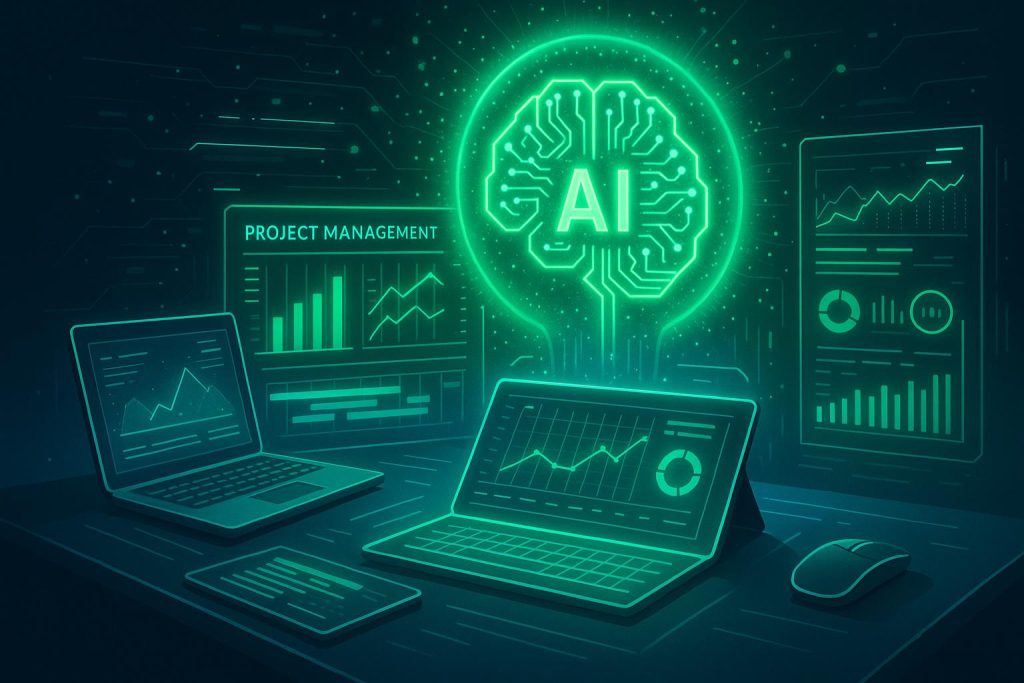Listen to the article
The integration of artificial intelligence into project management is accelerating, offering automated workflows, predictive analytics, and enhanced collaboration, transforming how organisations deliver projects amidst increasing complexity and remote work challenges.
Managing projects in the modern digital economy is increasingly challenging, as project managers must juggle time, cost, quality, and human resources while navigating the complexities of remote work and tight deadlines. Traditional project management tools like spreadsheets and standard software have limited capacity to address these demands efficiently. Artificial intelligence (AI) tools have emerged as pivotal solutions that enable automation, predictive analytics, smarter resource management, and enhanced collaboration, transforming project management into a more strategic, data-driven endeavour.
AI’s principal value lies in automating routine and repetitive tasks such as scheduling meetings, sending reminders, updating project statuses, and generating reports. This automation frees project managers to concentrate on higher-value activities like strategic planning and problem-solving. Tools with AI-driven automation features, such as Trello with Butler AI and ClickUp AI, can dynamically update project timelines and workflows, significantly reducing manual oversight and human error.
The vast amounts of data generated by projects today pose challenges for timely and accurate decision-making. AI-powered predictive analytics can forecast risks, budget overruns, and deadlines by analysing historical project data. Platforms like Wrike employ AI to flag high-risk tasks proactively, enabling managers to mitigate issues before they escalate. Predictive insights also extend to smarter resource allocation, ensuring task assignments align with team members’ workload and skillsets, preventing burnout and inefficiencies, exemplified by Microsoft Project’s integration with Power BI.
Collaboration, especially in distributed or hybrid teams, is enhanced by AI through virtual assistants and chatbots that provide instant responses to queries, summarise conversations, and facilitate multilingual communication. Zoho’s Zia AI, for instance, acts as a project assistant that integrates query responses and predictive timelines, fostering smoother team alignment and faster decision-making.
Risk management is another critical area improved by AI’s ability to monitor project performance in real-time and identify anomalies such as declining productivity or overspending. AI systems in platforms like Jira alert managers to potential bottlenecks in agile workflows, allowing timely corrective action to avoid delays and disruptions.
Personalisation of workflows through AI is gaining traction, with machine learning tailoring project management tools to fit the unique requirements of different teams and departments. Monday.com and similar platforms adapt dashboards and automate workflow patterns based on prior project data, enhancing flexibility and user satisfaction.
The integration capabilities of AI with other enterprise tools—such as CRMs, ERP systems, cloud platforms, and collaboration software like Slack and Microsoft Teams—create unified ecosystems that reduce silos and improve efficiency. This interoperability is crucial as organisations seek to leverage AI without disrupting existing infrastructure.
While AI offers substantial benefits—including enhanced productivity by saving managerial time, cost optimisation via better resource utilisation, and competitive advantage through faster and more reliable project delivery—the adoption of AI tools is not without challenges. High initial investments, skill gaps, and the need for comprehensive training can impede effective implementation. Additionally, concerns about data privacy and security require careful management to comply with regulations like GDPR and CCPA. Integrating AI with legacy systems may present technical obstacles, and cultural resistance within organisations needs addressing to ensure adoption. Overdependence on AI without human oversight risks overlooking contextual nuances, potentially leading to flawed decisions.
Moreover, maintaining the accuracy and relevance of AI systems demands ongoing updates and fine-tuning, which add to the long-term resource commitment. Despite these hurdles, the scalability and adaptability of AI solutions mean they can grow alongside an organisation’s evolving needs, making them viable for both small businesses and large enterprises.
Small businesses can particularly benefit from AI by automating administrative tasks such as invoice processing, scheduling, expense tracking, and client communication through chatbots. Cost-effective AI platforms like ClickUp AI and Zoho Projects offer accessible entry points for firms with limited resources, allowing them to enhance operational efficiency and scalability.
Looking ahead, the future of AI in project management promises even deeper integration, including voice-activated assistants for hands-free task management, hyper-personalised workflows tailored to individual project demands, and seamless end-to-end automation encompassing planning, execution, and reporting. Organisations that embrace AI early and collaborate with experienced artificial intelligence solution providers or developers can secure sustainable competitive advantages by delivering projects more efficiently and with reduced risk.
In summary, artificial intelligence is no longer a theoretical innovation but a practical necessity that reshapes project management. AI tools empower businesses to automate mundane tasks, anticipate and manage risks proactively, optimise resources intelligently, and foster effective collaboration across dispersed teams. While challenges to adoption exist, the strategic implementation of AI promises to enhance productivity, reduce costs, and improve project outcomes in an increasingly complex business environment. Partnering with knowledgeable solution providers and investing in appropriate training are critical steps for organisations seeking to harness AI’s transformative potential in project management.
📌 Reference Map:
- – Paragraph 1 – [1], [4], [2]
- – Paragraph 2 – [1], [6], [4]
- – Paragraph 3 – [1], [2], [5]
- – Paragraph 4 – [1], [4], [6]
- – Paragraph 5 – [1], [4], [6]
- – Paragraph 6 – [1], [6], [7]
- – Paragraph 7 – [1], [2], [3]
- – Paragraph 8 – [1], [3], [5]
- – Paragraph 9 – [1], [4]
- – Paragraph 10 – [1], [6]
- – Paragraph 11 – [1], [4], [6]
Source: Fuse Wire Services


